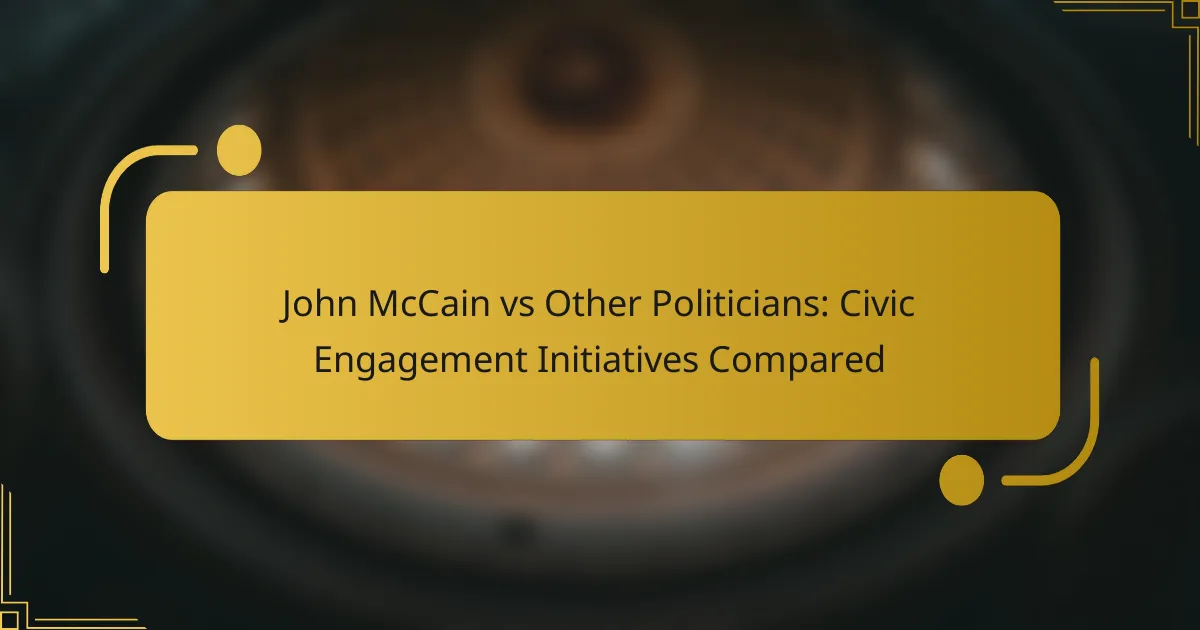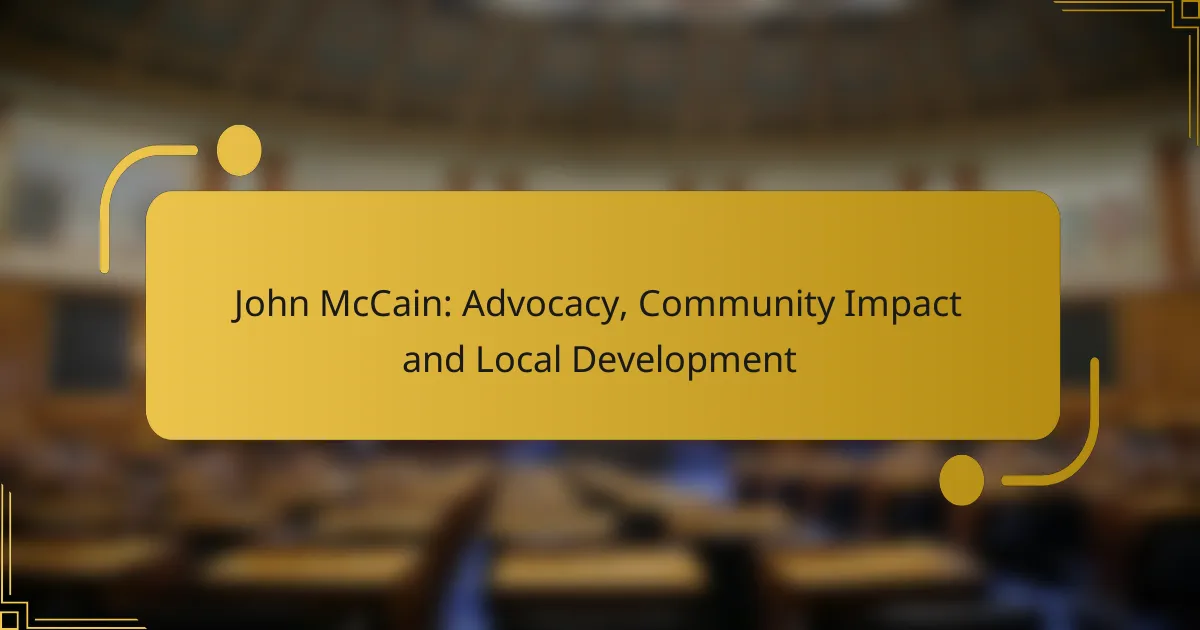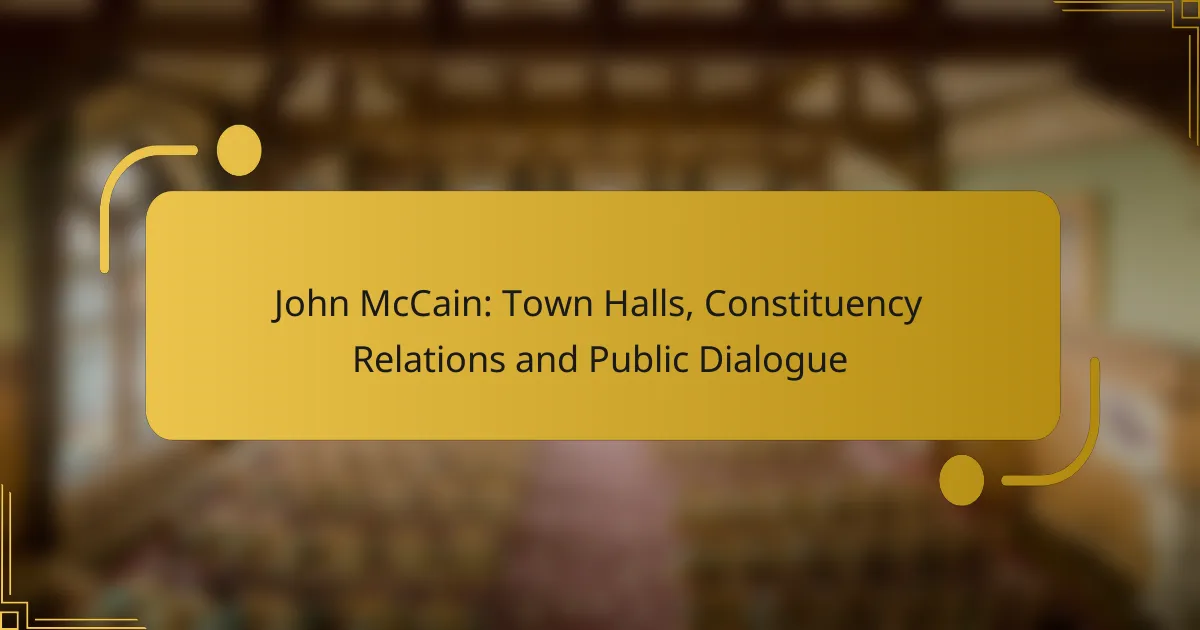John McCain’s civic engagement initiatives were distinguished by a commitment to bipartisanship and national service, aiming to enhance community welfare and promote active citizenship. Unlike many politicians who concentrate on narrow issues, McCain’s approach fostered a culture of civic responsibility, encouraging broader participation in governance and local matters. His efforts not only supported healthcare for children and veterans but also aimed to strengthen the fabric of democracy through increased civic involvement.
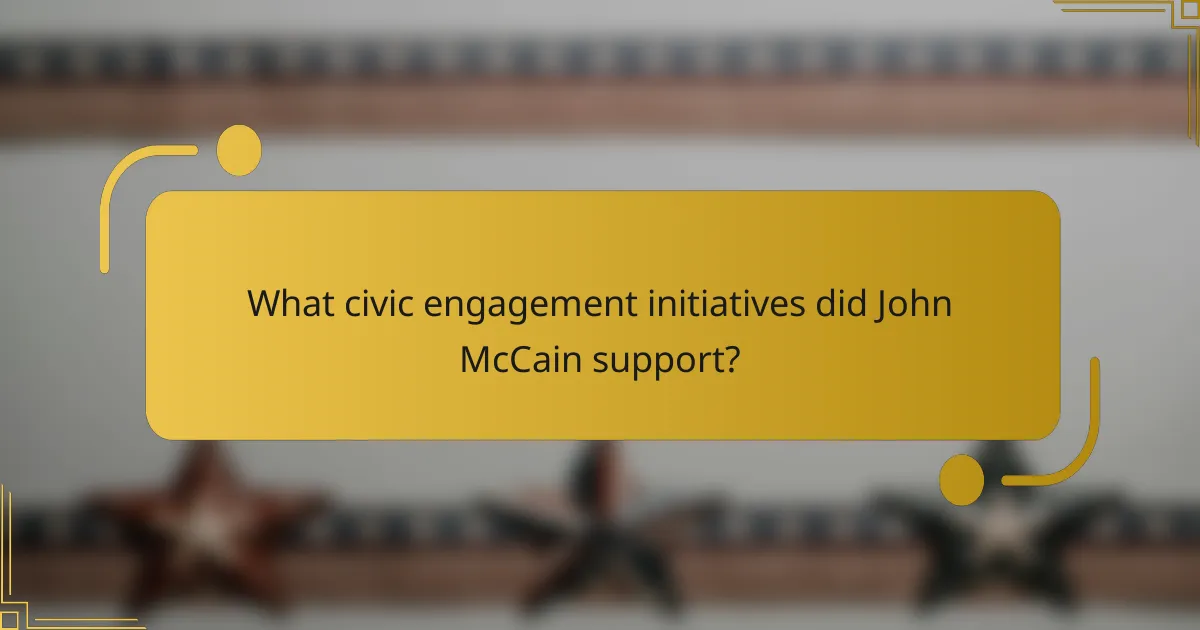
What civic engagement initiatives did John McCain support?
John McCain championed various civic engagement initiatives aimed at promoting leadership, supporting healthcare for children, and enhancing services for veterans. His efforts focused on fostering active citizenship and improving community welfare through strategic partnerships and dedicated foundations.
McCain Institute for International Leadership
The McCain Institute for International Leadership was established to promote democracy, human rights, and global leadership. It offers programs that engage emerging leaders from various sectors, providing them with the tools and knowledge necessary to effect positive change in their communities.
Through initiatives like the Next Generation Leaders program, the Institute empowers young leaders from around the world to address pressing social issues. Participants gain access to mentorship, training, and networking opportunities that enhance their civic engagement efforts.
Operation Smile partnership
John McCain partnered with Operation Smile, an organization dedicated to providing free reconstructive facial surgery to children with cleft lips and palates. This collaboration highlighted McCain’s commitment to improving healthcare access for underprivileged children globally.
Through this partnership, McCain helped raise awareness and funds, enabling thousands of children to receive necessary surgeries. The initiative not only transformed lives but also encouraged civic participation by inspiring others to support similar healthcare causes.
Support for veterans’ programs
McCain was a staunch advocate for veterans’ programs, emphasizing the need for comprehensive support for those who served in the military. His efforts included pushing for improved healthcare services, job training, and mental health resources for veterans.
He worked on legislation aimed at enhancing the Veterans Affairs system, ensuring that veterans received timely and quality care. McCain’s advocacy also encouraged civic engagement among veterans, promoting their active participation in community service and leadership roles.
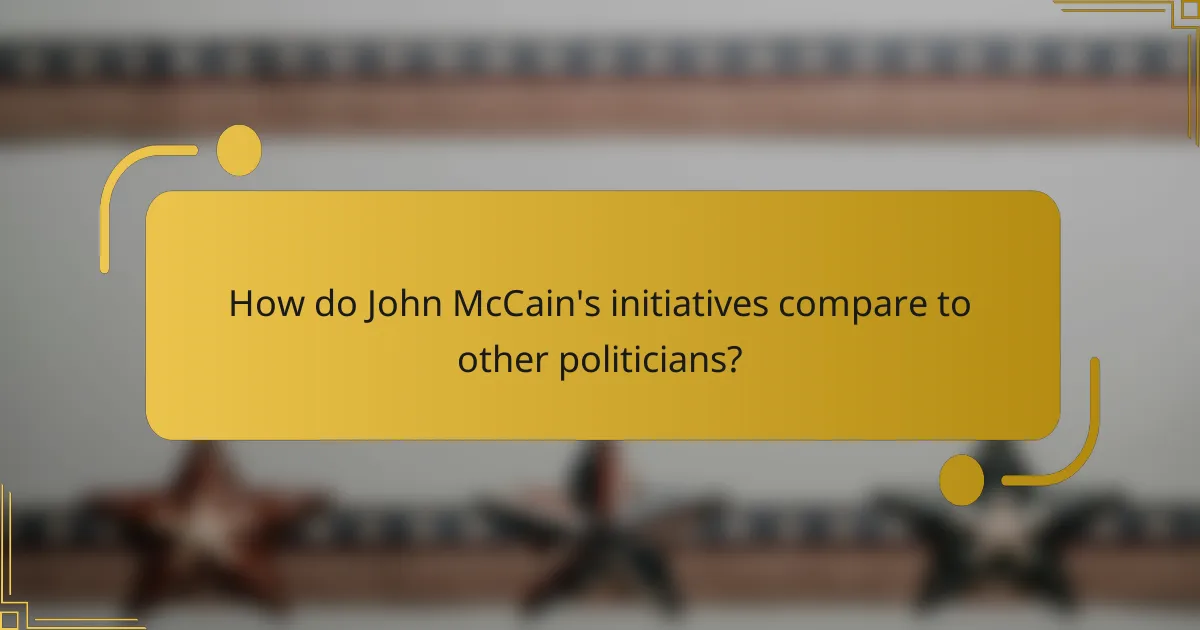
How do John McCain’s initiatives compare to other politicians?
John McCain’s civic engagement initiatives are characterized by a strong emphasis on bipartisanship and national service, which sets him apart from other politicians. While many leaders focus on specific issues, McCain’s approach sought to foster a broader culture of civic responsibility and community involvement.
Barack Obama’s community organizing efforts
Barack Obama’s community organizing efforts primarily focused on empowering local communities to advocate for their needs. His work in Chicago laid the groundwork for his political career, emphasizing grassroots mobilization and the importance of community voices in shaping policy. This approach often involved training residents to engage in political processes and address social issues directly.
Obama’s initiatives encouraged collaboration among diverse groups, aiming to build coalitions that could effectively push for change. His emphasis on community engagement has influenced many of his policies, particularly in healthcare and education reform.
Hillary Clinton’s advocacy for children’s health
Hillary Clinton’s advocacy for children’s health has been a cornerstone of her public service, focusing on issues like healthcare access and nutrition. Her initiatives, such as the Children’s Health Insurance Program (CHIP), aimed to ensure that low-income families could secure necessary medical care for their children. Clinton’s work often highlighted the importance of preventive care and early intervention.
Through her foundation, she has continued to promote health initiatives globally, addressing issues such as childhood obesity and access to clean water. Her efforts underscore the critical role of health in overall child development and community well-being.
Bernie Sanders’ grassroots campaigns
Bernie Sanders’ grassroots campaigns are known for their focus on economic inequality and social justice, mobilizing supporters through small donations and volunteer efforts. His approach emphasizes the importance of collective action and has inspired a new generation of activists to engage in political processes. Sanders often advocates for policies like universal healthcare and tuition-free college, aiming to address systemic issues affecting working-class Americans.
His campaigns leverage social media and community organizing to build momentum, demonstrating how grassroots movements can challenge established political norms. Sanders’ initiatives highlight the power of civic engagement in advocating for transformative change in society.
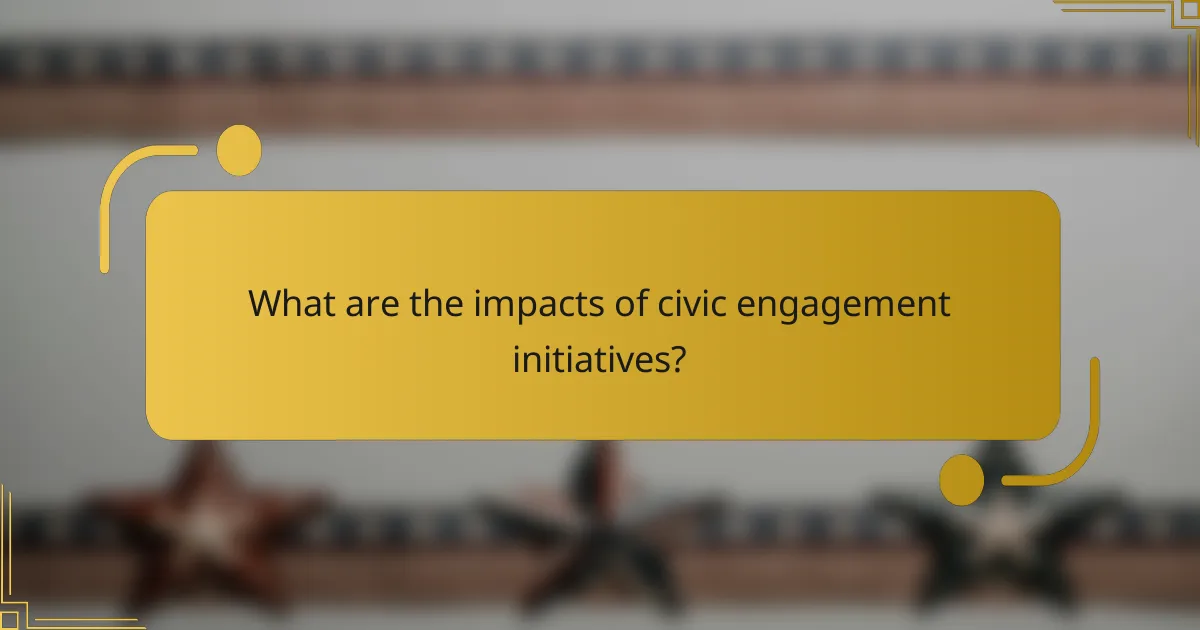
What are the impacts of civic engagement initiatives?
Civic engagement initiatives significantly influence democratic participation and community cohesion. They encourage individuals to take an active role in governance and local issues, leading to a more informed and involved citizenry.
Increased voter participation
Civic engagement initiatives often lead to higher voter turnout during elections. Programs that educate citizens about the voting process and provide resources, such as registration drives, can increase participation rates by several percentage points.
For example, initiatives that target underrepresented groups, such as young voters or minorities, can effectively mobilize these populations, contributing to a more representative electoral outcome. Communities that prioritize voter engagement typically see a more vibrant democratic process.
Strengthened community ties
Civic engagement fosters stronger connections among community members. When individuals participate in local initiatives, they build relationships and networks that enhance social cohesion.
For instance, neighborhood clean-up events or town hall meetings not only address local issues but also create a sense of belonging and shared purpose. These activities encourage collaboration and trust among residents, leading to a more resilient community.
Enhanced public awareness of issues
Civic engagement initiatives raise awareness about critical social and political issues. By facilitating discussions and providing educational resources, these programs inform citizens about local and national challenges.
For example, campaigns that focus on environmental sustainability can mobilize community action and influence public policy. When citizens are well-informed, they are more likely to advocate for change and hold their leaders accountable, resulting in a more engaged and informed populace.
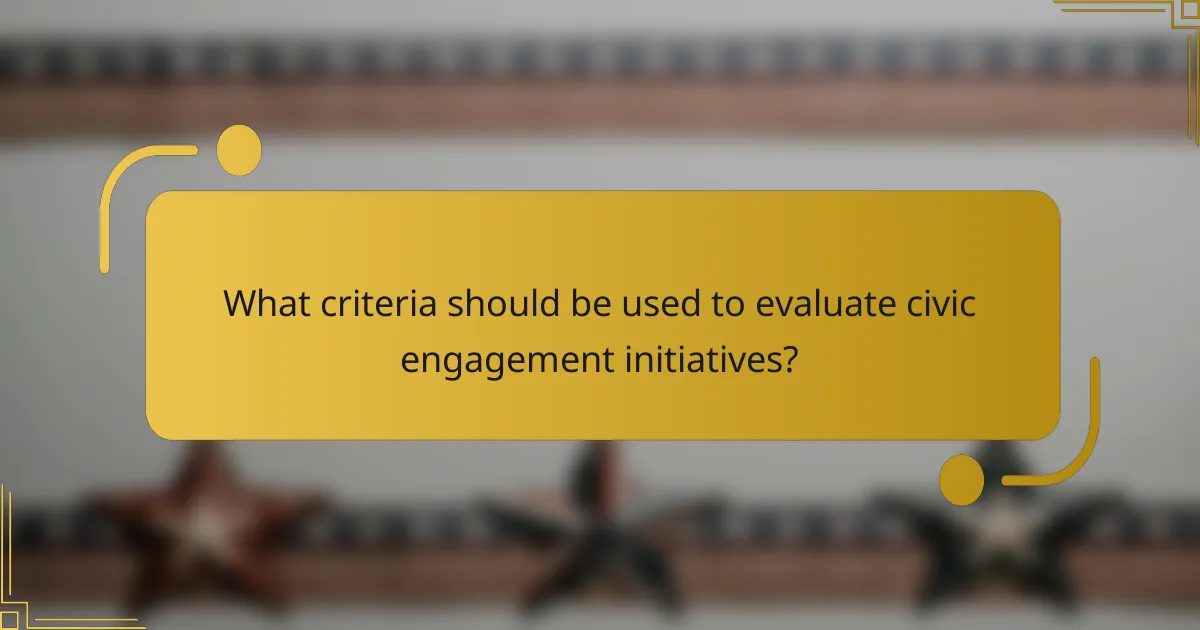
What criteria should be used to evaluate civic engagement initiatives?
To evaluate civic engagement initiatives effectively, consider criteria such as community impact, funding and resource allocation, and long-term sustainability. These factors help determine the initiative’s effectiveness and its potential for lasting change within the community.
Community impact measurement
Measuring community impact involves assessing how initiatives affect local populations and their engagement levels. This can include surveys, participation rates, and feedback from community members to gauge satisfaction and involvement.
Effective metrics might include the number of participants in civic events, the diversity of those participants, and changes in community attitudes towards civic participation. Regularly collecting and analyzing this data can help refine initiatives for better outcomes.
Funding and resource allocation
Funding is crucial for the success of civic engagement initiatives. Evaluating how resources are allocated can reveal whether funds are being used effectively to reach target populations and achieve desired outcomes.
Consider the sources of funding, whether they are government grants, private donations, or community fundraising. Transparency in how funds are spent and the impact of those expenditures is essential for maintaining community trust and support.
Long-term sustainability
Long-term sustainability focuses on whether civic engagement initiatives can maintain their impact over time. This involves planning for ongoing funding, community support, and adaptive strategies to respond to changing needs.
To enhance sustainability, initiatives should build partnerships with local organizations and stakeholders, ensuring that there is a shared commitment to civic engagement. Regular evaluations can help identify areas for improvement and ensure that initiatives remain relevant and effective.
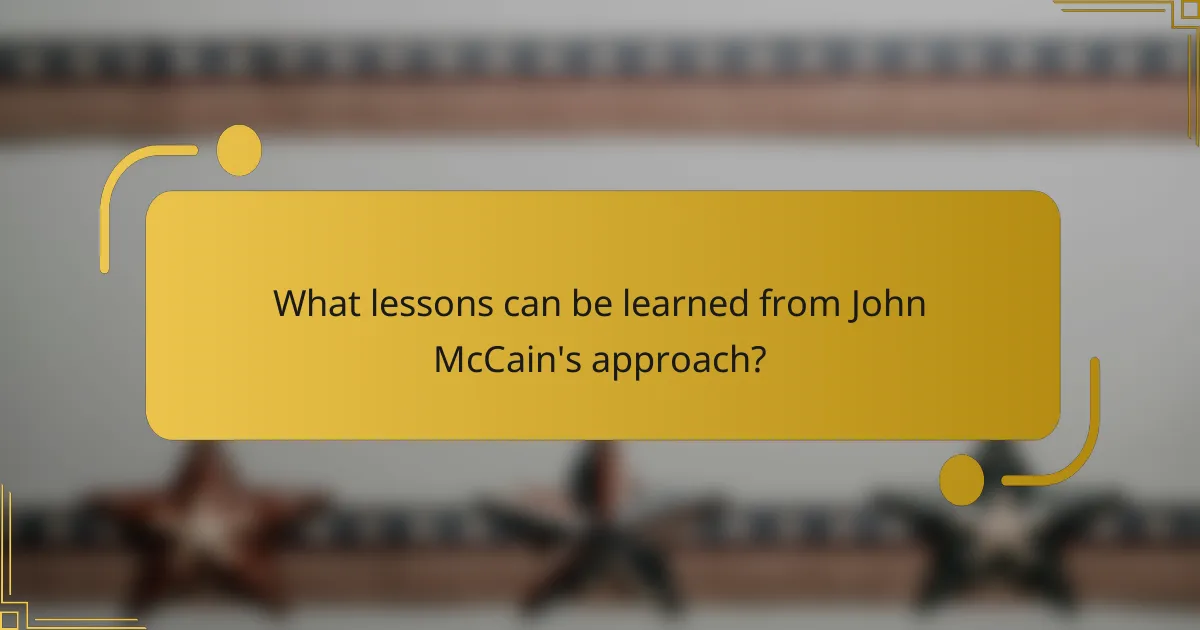
What lessons can be learned from John McCain’s approach?
John McCain’s approach to civic engagement emphasizes the importance of collaboration and community involvement. His strategies highlight how bipartisan support and active local engagement can enhance political initiatives and foster a more inclusive democratic process.
Importance of bipartisan support
Bipartisan support is crucial for the success of civic engagement initiatives. When politicians from different parties collaborate, they can pool resources and ideas, leading to more comprehensive solutions that appeal to a broader audience. This approach can help bridge divides and create a more unified front on key issues.
For example, initiatives that receive backing from both major political parties often see higher levels of public trust and participation. Engaging in dialogue and compromise can lead to legislation that reflects a wider range of constituents’ needs, ultimately enhancing the effectiveness of civic programs.
Engagement with local communities
Engaging with local communities is essential for fostering civic involvement. Politicians who prioritize direct interaction with their constituents can better understand the unique challenges and opportunities within their areas. This grassroots approach allows for tailored initiatives that resonate with local values and needs.
Effective community engagement can take many forms, such as town hall meetings, local forums, or collaborative projects with community organizations. These interactions not only build trust but also empower citizens to take an active role in shaping their governance, leading to stronger democratic practices.
